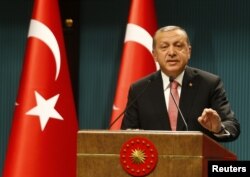Turkey says it will suspend the European Convention on Human Rights during the three-month state of emergency it declared to purge perpetrators of last week's failed coup.
Deputy Prime Minister Numan Kurtulmas said Turkey would take steps "like France has done under Article 15 of the convention" that allow signatories to abrogate from its obligations during times of war or public emergencies.
"The state of emergency will give the government a good opportunity to fight against coup plotters and clean the state coffers fully of members of the Gulenist organization," Kurtulmas was quotes as saying by the Hurriyet news agency.
Turkish lawmakers are expected to approve President Erdogan's call for a three-month state of emergency in a move that paves the way for further purging of his opponents, following Friday's failed attempt to topple him and his government.
Erdogan announced the state of emergency in a televised address late Wednesday, following meetings with his national security council and Cabinet.
Erdogan said the state of emergency’s purpose is “to be able to take the most efficient steps to return to democracy and rule of law.” The Turkish leader said the armed forces would not take control of the country during this time.
Crackdown expands
Hundreds of Erdogan supporters filled public venues across Turkey, including Istanbul’s Taksim Square, where his statement was carried live on big screens. The announcement of the state of emergency drew applause from the crowd.
The declaration allows Erdogan to expand an already massive crackdown that observers say primarily targets members of a spiritual movement led by Fethullah Gulen, a former imam who has been living in the United States for the past 17 years.
Since Friday more than 9,000 people, including 6,000 military, have been put in what Erdogan describes as “pre-trial detention.” By some estimates, almost 50,000 public officials, including judges and academics, were suspended or ordered to resign.
Turkish state media reports the government has banned all academics from traveling out of Turkey. More than 21,000 employees of the Education Ministry, including more than 1,500 university deans, were suspended Tuesday.
“The lynching has started,” said Beyza Ustun, an official of the Kurdish-dominated, left-wing People’s Democratic Party, reflecting the concern members of Turkey’s minorities have expressed at what they see as a growing threat to their rights.
Erdogan on Wednesday told al-Jazeera some of those detained after the attempted coup have started confessing and providing what the Turkish leader said is information that links the coup attempt to Gulen. He said he believes a foreign power may have been involved, and said it would be a big mistake if the United States decides not to extradite Gulen. Erdogan has also said he will approve capital punishment if it is approved by parliament.
Erdogan, whose Justice and Development Party won a comfortable victory in elections last November, has hailed his defeat of the coup as a triumph of democracy. But his heavy-handed tactics, especially after the foiled coup, have raised tensions with Washington.
While condemning the coup attempt, U.S. Secretary of State John Kerry said Washington wants to “make certain that as the response to the coup is implemented it fully respects that democracy that we are supporting."
U.S. President Barack Obama has urged Erdogan to ensure the investigations and prosecution of the coup’s perpetrators are conducted in ways that reinforce public confidence in democratic institutions and the rule of law.






